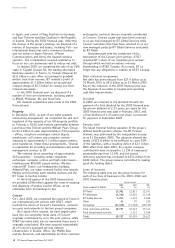BT 2003 Annual Report Download - page 21
Download and view the complete annual report
Please find page 21 of the 2003 BT annual report below. You can navigate through the pages in the report by either clicking on the pages listed below, or by using the keyword search tool below to find specific information within the annual report.Business review
20 BT Annual Report and Form 20-F 2003
Carter) and supported by executive and non-executive
board members.
The reforms are in two parts. The first comprises
the Office of Communications Act passed in March
2002, which enables the board, office and budgets of
Ofcom to be established, but does not enable Ofcom
to exercise any regulatory functions. The second
comprises a Communications Bill. The draft Bill was
published in May 2002 and the final Bill is expected to
be passed by Parliament by 17 July 2003. It will confer
regulatory functions on Ofcom, which will be able to
take up those functions when the Bill is brought into
force. However, Ofcom is not expected to take up its
regulatory functions until later in the year and the Bill
provides for a transitional period between the Bill
coming into force and the date when Ofcom takes up
its formal powers. In this period, the existing regulators
will carry out Ofcom’s functions relating to networks
and services, and spectrum.
The main changes for providers of electronic
communications networks and services will be the
possibility of fines being imposed for breach of
regulatory obligations, appeals on the merits against
regulatory decisions and the creation of a new
regulatory regime which will, among other things,
implement the requirements of the new EU Directives
for general authorisations, instead of individual
licences, and basing regulation of dominant players
on analyses of relevant markets. Statutory instruments
have been made to enable preliminary work to be
undertaken to implement the Directives, and, in the
event that the Bill is not passed before 25 July 2003,
the deadline for implementation, the Government will
ensure implementation by means of further statutory
instruments which will, for a limited period, duplicate
provisions in the Bill.
Competition
The competitive environment
The UK telecommunications market is fully open to
entry and highly competitive. As a result, the UK
Government and Oftel have indicated their expectation
that it will be appropriate to move away from sector-
specific (including licence-based) regulation to greater
reliance on the Competition Act as individual markets
become sufficiently competitive. Furthermore, the new
EU Directives – see ‘‘New European Union Directives’’
– prohibit the imposition of competition based, sector-
specific economic regulation in any market which is
found to be effectively competitive.
In January 2000, Oftel published a strategy
statement based on the principle that regulation should
go no further than the minimum necessary to protect
consumers. The strategy is underpinned by a
programme of competition reviews, which are intended
to ensure that the regulatory framework responds to
changed competitive conditions: where it is found that
competition is delivering benefits to consumers in the
sectors reviewed, regulation will be reduced or
withdrawn as appropriate. These reviews will need to
be incorporated into the market reviews mandated by
the new EU Directives, which will come into force by
25 July 2003 (see ‘‘New European Union Directives’’).
Although it is some years since the
Telecommunications Act abolished the monopoly
of the former statutory corporation, British
Telecommunications, in the running of
telecommunication systems, obligations placed on BT,
including pricing regulation and the requirement to
provide universal service (discussed below) are
generally more onerous than for other licensees.
Competition Act
In addition to telecommunications industry regulation,
BT is subject to general competition law.
By virtue of provisions in the Competition Act
1998, UK competition law is in line with European
Community law in prohibiting anti-competitive
agreements and concerted practices and the abuse
of a dominant market position. In the case of
telecommunications, the Director General of
Telecommunications has concurrent investigatory and
enforcement powers with the Office of Fair Trading.
They also have significant investigative powers. Breach
of the relevant prohibitions could lead to fines of up to
10% of relevant turnover in the UK for each year of
infringement (up to a maximum of three years) and/or
result in claims for damages in the civil courts. There
are also powers to order a company to cease an
infringing activity. There is an independent mechanism
for appeals to the Competition Appeals Tribunal
against decisions under the Competition Act.
Oftel is continuing to investigate the terms and
conditions of BT’s telephone rental business under
the Competition Act. Also, following the decision of
the Competition Appeals Tribunal in the Freeserve case
in April 2003, Oftel has undertaken to re-issue a
decision on BT Openworld’s broadband activities.
Enterprise Act
The Enterprise Act 2002, which received Royal Assent
on 7 November 2002, aims to give more independence
to the competition authorities, to reform insolvency
and bankruptcy laws and to tackle trading practices
that harm consumers.
The provisions of the Act are largely complementary
to those of the Competition Act 1998, which will remain
in force with some minor amendments – but it also
contains new provisions criminalising cartels and
allowing for the disqualification, in appropriate cases,
of company directors where companies commit
breaches of competition law.
Pricing regulation
Fixed network
We are subject to price controls on our fixed network
services in the UK at two levels: retail and network.
Fixed network competitors are generally not subject to
direct price controls, although there are some controls
on mobile network operators.
Retail price controls
We are subject to two sets of UK retail price controls,
one on certain public-switched telephony call charges
and exchange line rentals, and one on certain private
circuits. Each price control is based on a formula
























